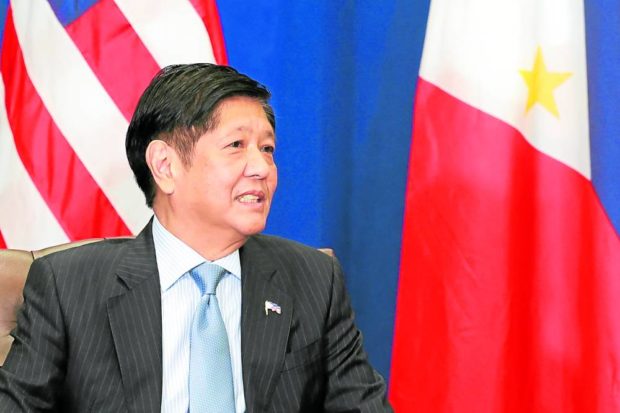 President Ferdinand Marcos Jr. (File photo from Malacañang)
President Ferdinand Marcos Jr. (File photo from Malacañang)NEW YORK CITY — Changing the “focus” of the fight against illegal drugs, President Ferdinand Marcos Jr. said he had told the Philippine National Police that he was “not interested” in small-time drug pushers and instructed officials to put more effort into going after big-time narcotics suppliers and distributors.
Marcos said on Friday that he gave the order during a meeting with top PNP officials after he took office on June 30, succeeding Rodrigo Duterte, whose brutal war on drugs is under investigation by the International Criminal Court (ICC) prosecutor.
“It is certainly my view that enforcement, which has been the part of the drug war that has been most vigorously pursued by President [Rodrigo] Duterte, only gets you so far. And my approach is slightly different,” Marcos told a forum with the Asia Society on Friday at the close of his six-day US visit.
“[During] my first command conference with our policemen, I said we will adjust. Let us adjust our focus … As to the enforcement, to put it very bluntly, I simply told them, ‘Look I’m not interested in the kid who makes P100 a week selling weed.’ That’s not the person that I want you to go after,” he said.
“I want you to go after people who, if we get them, if we neutralize them, or put them in jail, we put them away, whatever it is, we will make an actual difference so that the supply of drugs, the system of distribution, the system of importation of drugs because much of it really does come from abroad. That will actually make a difference, it will put a stop to it,” Marcos said.
Duterte’s anti-drug campaign has led to thousands of alleged extrajudicial killings whose victims were mostly impoverished suspected drug pushers and users who were gunned down during police anti-drug operations.
Data from the independent monitor Dahas PH, whose members are mostly from the University of the Philippines Third World Studies Program, have shown that Duterte’s drug war consistently targeted small-time pushers, failing in its promise to bring down so-called high-value targets.
‘New war on drugs’
Toward the end of his term, Duterte admitted that he was unable to end the country’s drug problem, which he promised to get rid of in three to six months after taking office in June 2016. He said his self-imposed deadline was just a campaign “hubris,” adding that he was “really wrong” in making the promise.
After he won the elections in May, Marcos said Duterte told him to continue the controversial anti-drug campaign.
In an interview with vlogger Toni Gonzaga earlier this month, the President said the war on drugs would continue, but it would be waged in a different manner.
He said there were “working groups putting together the new war on drugs.”
Marcos emphasized measures for drug prevention and rehabilitation of drug addicts.
‘More sensitive’
The government’s drug rehabilitation program has to be “more sensitive and more sympathetic to those who actually have gotten caught up in this lifestyle … pull them out of that culture and to help them start again and do live a good life as good and contributing members of society,” he said.
At the forum in New York, Marcos said: “We cannot stop the drug war. The problem continues to exist. What we can do is to examine and learn lessons from the experience from the past administration.”
The president said last week that ICC investigators need not come to the Philippines to look into the alleged crimes against humanity committed by his predecessor and other officials in the drug war.
The only way that the ICC investigators would be welcomed into the country would be “if the whole system collapses” or “if we have a war here,” Marcos said.
He also said the country would not rejoin the ICC, which it left in March 2019 by withdrawing from the Rome Statute, the treaty that established the tribunal based in The Hague, Netherlands.
On ICC probe
Marcos said the ICC should not intervene in the country’s domestic affairs.
“The alleged crimes were all committed in the Philippines; they were all committed by Filipinos. Why will we need a foreigner to tell us how to deal with it?” he said in an interview with the newly launched ALLTV network of billionaire Manuel Villar.
Duterte ordered the withdrawal of the Philippines from the ICC after its prosecutor opened in February 2018 a “preliminary examination” of allegations of crimes against humanity committed by the former president in his drug war since his days as mayor of Davao City.
Although the Philippines withdrew its membership from the ICC in March 2018, taking effect one year later, the ICC said it had jurisdiction over the country until March 2019.
Under Article 127 of the Rome Statute, a state “shall not be discharged, by reason of its withdrawal, from the obligations arising from this Statute while it was a Party to the Statute, including any financial obligations which may have accrued.”
—WITH A REPORT FROM INQUIRER RESEARCH
